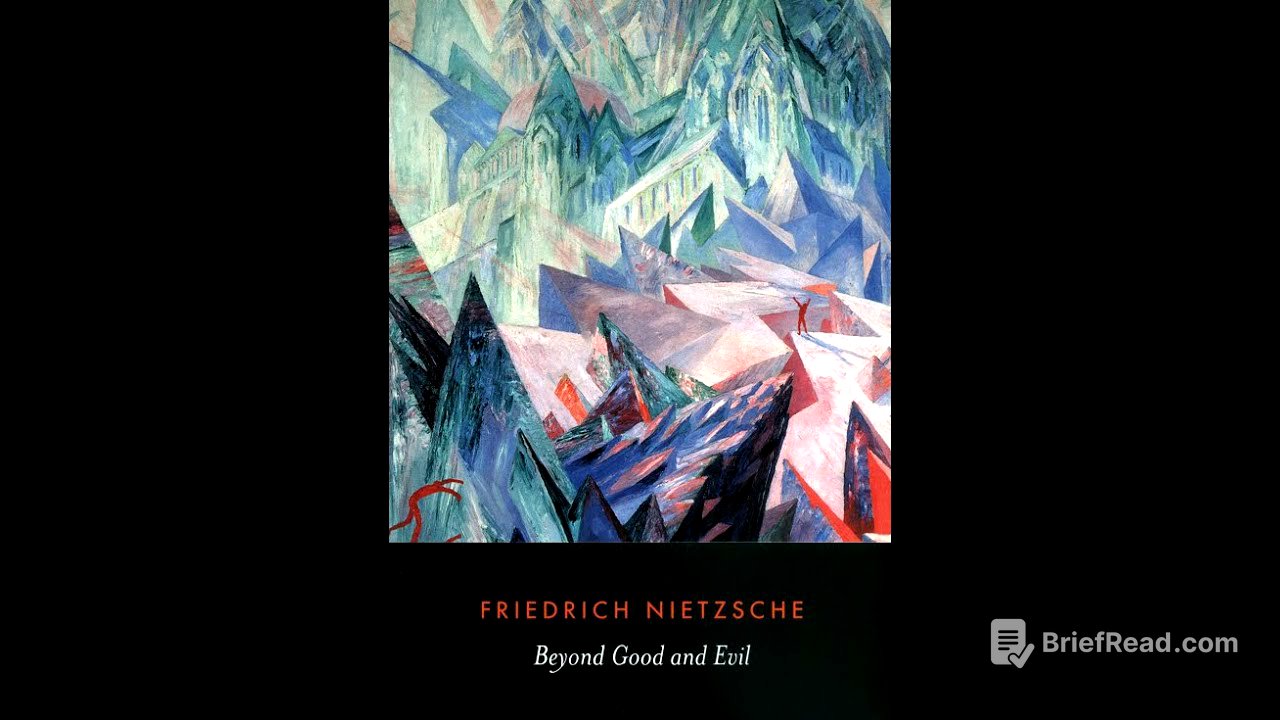TLDR;
"Beyond Good and Evil" by Friedrich Nietzsche is a critique of traditional philosophy and morality, advocating for a re-evaluation of values and the embrace of a new kind of philosopher. Nietzsche challenges the assumptions of past thinkers, emphasizing the role of psychology and the will to power in shaping our understanding of the world.
- Critique of traditional philosophy and morality
- Emphasis on psychology and the will to power
- Advocacy for a re-evaluation of values
- Vision of a new kind of philosopher
Introductory Note on Friedrich Nietzsche [0:08]
Friedrich Nietzsche, who died in 1900, has become increasingly influential in modern thought, impacting philosophy and various other subjects. Born in 1844 in Prussia, he studied classical philology and later became a professor at Basel. He resigned due to health issues and lived as an independent writer, publishing books like "Beyond Good and Evil" in 1886. In 1889, he suffered a mental breakdown and died in 1900. Nietzsche's writing style is characterized by aphorisms, poetical images, and enigmatic questions, making his arguments ambiguous and open to interpretation. His central theme in "Beyond Good and Evil" is an assault on traditional European morality, which he views as superficial due to philosophers' flawed assumptions, linguistic errors, unconscious motivations, and limited historical understanding.
Prologue [3:34]
In the prologue, Nietzsche declares the end of philosophical dogmatism, dismissing such systems as childish games based on ignorance. He criticizes Plato's concept of "the good as such," which Christianity adopted. Nietzsche suggests that truth is elusive and that philosophical dogmatism has failed to win it over. He hopes that dogmatism will soon be seen as a rudimentary game. He points out that grand things often appear in distorted forms, like the Vedanta doctrine and Platonism. While acknowledging the negative aspects of dogmatism, such as Plato's invention of the purely spiritual, Nietzsche recognizes the tension created by the fight against Platonism and Christianity, which has enabled new directions for the European spirit.
Part One: On the Prejudices of Philosophers [9:19]
Nietzsche questions basic philosophical assumptions, such as the opposition between truth and falsity, and challenges the value of truth over appearance. He argues that philosophers have blindly accepted societal beliefs instead of questioning them. He claims that falsifications are necessary for human life because we lack direct access to the truth, relying instead on interpretations that provide different perspectives. Nietzsche extends this idea to science and the belief in cause and effect, asserting that philosophical perspectives arise from unconscious desires. Philosophers create systems that cater to their needs and then retroactively invent reasons to support their claims, presenting their interpretations as discovered truths. Nietzsche applies his psychological understanding to unmask philosophers' truth claims, critiquing their assumptions about thinking and willing. He dismisses immediate certainties and the concept of free will, asserting that introspection contradicts these assumptions. He concludes by emphasizing the importance of psychology, free from moral beliefs, in understanding the complexity of the human mind.
1. [12:56]
Nietzsche questions the will to truth, asking why truth is preferred over untruth, uncertainty, or ignorance. He suggests that the value of truth is a problem that philosophers must confront, implying a dangerous risk in pursuing it.
2. [14:42]
Nietzsche challenges the idea that truth can arise from error or selfless action from self-seeking, deeming such origins impossible. He asserts that things of high value must have appropriate origins, separate from the deceptive world. This prejudice, typical of metaphysicians, underlies their logical procedures and beliefs about truth. Nietzsche questions the opposition of values, suggesting that it may be a temporary perspective. He proposes that appearance, deception, self-interest, and desire might hold higher value and be intertwined with undesirable things. He calls for a new style of philosopher willing to confront this dangerous possibility.
3. [17:48]
Nietzsche asserts that conscious thinking, even in philosophy, is largely instinctual. He dismisses the significance of consciousness as separate from instinct, arguing that a philosopher's thinking is secretly led by instincts. Logic is driven by evaluations of worth and physiological demands for preserving a particular way of life. These evaluations, such as valuing certainty over uncertainty, may be necessary for beings like us but are not necessarily universal truths.
4. [19:16]
Nietzsche claims that the falsity of a judgment is not an objection if it sustains or creates life. He asserts that the falsest judgments, including synthetic a priori judgments, are indispensable for human beings to live. Without logical fictions and constant falsification, humans could not survive. Giving up false judgments would mean renouncing life itself. A philosophy that dares to concede the fictional nature of life stands beyond good and evil.
5. [20:30]
Nietzsche criticizes philosophers for their lack of honesty, noting that they often defend pre-assumed principles with reasons sought after the fact. He accuses them of being advocates who disguise their judgments as truths and lack the courage to admit their biases. He mocks the hypocrisy of philosophers like Kant and Spinoza, who present their philosophies as objective and disinterested while defending their own heartfelt wishes.
6. [22:59]
Nietzsche states that every great philosophy is a self-confession and unintentional memoir of its originator. He argues that the moral intentions within a philosophy form the essential seed from which the entire system grows. When examining metaphysical claims, it is important to ask what moral aim the philosopher is pursuing. Nietzsche believes that the drive to knowledge is not the primary motivation for philosophy but rather a tool for another drive. All drives, including those considered base, have practiced philosophy and sought to present themselves as the ultimate purpose of existence. Unlike scholars, a philosopher's morality reveals their innermost drives and their rank ordering.
7. [25:30]
Nietzsche reflects on the maliciousness of philosophers, citing Epicurus's joke against Plato and the Platonists. Epicurus called them "dionysio colickies," implying they were actors and flatterers of Dionysus. This jab targeted Plato's magnificent manners and self-presentation, which Epicurus found irritating. It took a century for Greece to realize who Epicurus was, suggesting his ambition and rage against Plato fueled his work.
8. [26:45]
Nietzsche observes that every philosophy has a point where the philosopher's conviction takes center stage, likening it to the arrival of an ass in an old mystery play.
9. [27:01]
Nietzsche critiques the Stoics' call to "live according to nature," arguing that nature is extravagant, indifferent, and without purpose. He questions how one can live in accordance with such indifference, as living implies appraisal, preference, and injustice. He suggests that the Stoics' imperative is a form of self-deception, where they attempt to impose their morality on nature. Nietzsche asserts that philosophy is a tyrannical drive, a spiritual will to power that seeks to create the world in its own image.
10. [29:38]
Nietzsche observes the enthusiasm and subtlety with which Europeans approach the problem of the true and apparent world, suggesting that there is more than just a will to truth at play. While some may genuinely seek certainty, stronger thinkers appear to be motivated by something different. They question appearances and mention perspective, indicating a mistrust of modern ideas and a desire to reclaim something from an earlier faith. This mistrust and scorn for positivism drive them away from modern reality, not necessarily backward, but away.
11. [32:42]
Nietzsche notes that people are trying to direct their gaze away from Kant's real influence, particularly his pride in the table of categories and the discovery of synthetic judgments a priori. He questions Kant's answer to how synthetic judgments a priori are possible, suggesting it is merely a repetition of the question. Nietzsche proposes replacing Kant's question with "Why is the belief in such judgments necessary?" He argues that belief in synthetic judgments a priori is necessary for preserving beings like us, even if they are false. German philosophy, influenced by Kant, has provided a "vertus dormitiva" (sleep-inducing virtue) that has lulled people into a superior way of putting the senses to sleep.
12. [37:52]
Nietzsche states that materialistic atomism has been refuted, and few scholars still take it seriously. He credits Boscovich for challenging the belief in the final thing that made the earth stand firm: atomic particles. This was the greatest triumph over the senses. Nietzsche calls for war against the atomistic need that persists in metaphysics and against the atomism of the soul taught by Christianity. He suggests new versions of the hypothesis of the soul, such as mortal soul or soul as a social structure of drives, should be considered. The new psychologist is preparing an end to superstition and pushing himself into a new desert and mistrust.
13. [40:47]
Nietzsche argues that physiologists should reconsider the drive to preserve the self as the cardinal drive in organic beings. He asserts that living itself is will to power, and self-preservation is merely a consequence. He warns against extraneous teleological principles, such as the drive for self-preservation, which he attributes to Spinoza's inconsistency.
14. [41:34]
Nietzsche suggests that physics is only an interpretation of the world for our benefit, not an explanation. It relies on faith in the senses and appeals to plebeian taste through appearance and tangibility. The reluctance to accept obvious evidence of the senses was the magic of the Platonic way of thinking. The enjoyment in overcoming this world and interpreting it in Plato's manner differs from today's physicists, Darwinists, and anti-teleologists. Where there is nothing more to look at and grip, there is nothing more to seek out.
15. [43:52]
Nietzsche asserts that physiology must hold to the principle that sense organs are not phenomena in the idealistic sense and cannot be causes. Sensualism is a regulative hypothesis. The idea that the outer world is the work of our organs leads to a reductio ad absurdum, as it implies our organs are the work of our organs. Therefore, the exterior world is not the work of our organs.
16. [44:50]
Nietzsche dismisses the belief in immediate certainties, such as "I think" or "I will," as superstitions. He argues that immediate certainty and the thing in itself are contradictory terms. He urges people to free themselves from the seduction of words and recognize that "I think" presupposes a series of assertions that are difficult or impossible to ground. This "I think" does not have any immediate certainty. Instead, the philosopher encounters metaphysical questions about the origin of thinking, belief in cause and effect, and the right to speak of an "I" as a cause.
17. [47:46]
Nietzsche emphasizes that a thought comes when it wants to, not when "I" want it. He argues that it is a falsification to say that the subject "I" is the condition of the predicate "think." The "it" in "it thinks" is an interpretation of the event, not part of the process itself. Following grammatical habits, we conclude that thinking is an activity belonging to someone who does the action, similar to how older atomists looked for the atom where force was located. Stronger heads have learned to cope without this "it," and logicians may one day do the same.
18. [49:23]
Nietzsche suggests that the fact that a theory can be disproved is part of its charm, attracting finer minds. The theory of free will, despite being refuted, owes its continuing life to this charm.
19. [49:48]
Nietzsche challenges the common understanding of the will, arguing that it is not a simple, well-known entity. Willing involves a multiplicity of feelings, including the feeling of a condition away from which and towards which, as well as muscular feelings. Thinking is also an ingredient of willing, with a commanding thought inseparable from the act. The will is an effect of the commander, with freedom of the will being the feeling of superiority over the one who obeys. Willing involves giving orders to something within oneself that obeys or is thought to obey. The strangest thing about willing is that we are both the one ordering and the one obeying, leading to mistaken conclusions and false evaluations. The person willing believes that willing is sufficient for action and ascribes success to the will itself, enjoying an increase in the feeling of power. Freedom of the will is the enjoyment in the person willing who commands and identifies with what is carrying out the order. All willing is a matter of giving orders and obeying on the basis of a social construct of many souls.
20. [54:58]
Nietzsche argues that philosophical ideas are not spontaneous but develop in relationship with each other, forming a system. Philosophers, under an invisible spell, run around the same orbit, driven by an inborn taxonomy and relationship of ideas. Thinking is less a discovery than a recognition, a remembering of ideas from a primordial collective household of the soul. Practicing philosophy is a form of atavism. The similarity of Indian, Greek, and German philosophy is due to the common philosophy of grammar, which prepares for a similar development of philosophical systems. The spell of grammatical functions is the spell of physiological judgments of value and racial conditions.
21. [57:20]
Nietzsche calls the "causa sui" (something being its own cause) the best self-contradiction, a logical rape and perversity. The demand for freedom of the will, in a metaphysical sense, is an attempt to pull oneself into existence out of nothingness. He invites those who reject free will to also reject the unfree will, which leads to an abuse of cause and effect. Cause and effect should be used merely as conventional fictions for indicating and communicating, not as explanations. In itself, there is no causal connection, necessity, or unfreedom. We fabricate causes, causal sequences, relativity, compulsion, number, law, freedom, reason, and purpose. The unfree will is a myth, and in real life, it is simply a matter of strong and weak wills. The problem of the unfreedom of the will has been seen from two contrasting points of view: those who want to retain responsibility and those who want to shift blame.
22. [1:01:17]
Nietzsche criticizes physicists for their "conformity to nature," arguing that it is an interpretation, not a text. He sees it as a humanitarian emendation that caters to democratic instincts and disguises hostility to privilege and autocracy. He suggests that someone could interpret nature as the tyrannical enforcement of power claims. This interpreter would assert that the world has a necessary course, not because of laws, but because of the total absence of laws.
23. [1:03:28]
Nietzsche argues that psychology has remained hung up on moral prejudices and fears, failing to understand itself as the morphology and doctrine of the will to power. Moral prejudices have damaged and distorted the spiritual world. A true physical psychology must fight against unconscious resistance. Even a doctrine of the interdependence of good and bad drives creates distress in a hearty conscience. Taking effects of hate, envy, greed, and ruling as determining life causes an orientation in judgment as if one were seasick. There are good reasons to stay away from this realm of dangerous discoveries. However, if someone ends up here, they must keep their teeth clenched, eyes open, and hand firm on the tiller, moving directly over morality and smashing apart amorality. This will reveal a more profound world of insights, and psychology will be recognized as the mistress of the sciences.
Part Two: The Free Spirit [1:06:16]
Nietzsche describes the characteristics of new philosophers who can accept the fictional nature of truth and the biological facts of human existence. These free spirits must be strong and secretive, masking themselves to conquer traditional morality. They will live knowing that life is based on appearance and deception, with the only reality being the world of desire and passions. This knowledge will emancipate them, making them creative spirits able to generate new insights. Nietzsche hypothesizes that this world of desires and passions can be traced back to a single will: the will to power. His assumptions about human beings are rooted in biology and instincts rather than free will or rationality. The strongest individuals act on their will to power, constantly experimenting and creating their own truths without imposing them on others. Nietzsche distinguishes these free spirits from free thinkers wedded to democratic or socialist ideals. His philosophers of the future will move into an uncharted world beyond good and evil, not championing modern political and social ideas.
24. [1:08:55]
Nietzsche reflects on how human beings live in a simple and counterfeit way, marveling at how we have made everything bright, free, and simple around us. We give our senses free license for superficiality and our thinking a divine craving for erroneous conclusions. We maintain our ignorance to enjoy freedom, safety, carelessness, and merriment in life. Scientific knowledge rises on the foundation of ignorance, with the will to know based on a more powerful will not to know. Language continues to speak about opposites where there are only degrees, and even knowledgeable people understand how the best scientific knowledge wants to hold us in this simplified world, loving error because it loves life.
25. [1:10:47]
Nietzsche warns philosophers and friends of knowledge to protect themselves from martyrdom and suffering for the sake of truth, as it corrupts innocence and neutrality. He advises them to stand aside, retain their masks, and choose good solitude. Long wars make us poisonous, and long fear makes us personal. Those persecuted become sophisticated avengers. The martyrdom of a philosopher reveals how much of an agitator and actor he contains. People should be clear about what they are going to see in such cases: only a satter play, a farcical epilogue.
26. [1:14:22]
Nietzsche observes that every special human being strives for their own castle and secrecy, saved from the crowd. However, a person who seeks knowledge must eventually say that the rule-bound man is more interesting than the exception. The study of the average man, requiring disguise and bad company, is a necessary part of the philosopher's life. Cynics, who recognize the animal and meanness in themselves, provide shortcuts to understanding common souls. The higher man should open his ears to cynicism and think himself lucky when a shameless clown or scientific satter announces himself. The lover of knowledge should pay attention wherever people talk without indignation, as the indignant man is more ordinary and less instructive.
27. [1:18:40]
Nietzsche reflects on the difficulty of being understood, particularly when one thinks and lives differently from others. He does everything to make himself difficult to understand and appreciates goodwill in interpretation. He advises giving good friends a recreation room of misunderstanding or getting rid of them altogether.
28. [1:19:34]
Nietzsche discusses the difficulty of translating the tempo of a style rooted in the character of a race. He notes that Germans are almost incapable of "presto" (quick tempo) in their language and thus lack the nuances of free-spirited thinking. While solemn and lengthy styles are developed among Germans, figures like Aristophanes and Petronius are untranslatable. Lessing is an exception due to his play-acting nature and flight from Germany. The German language cannot imitate the tempo of Machiavelli or Petronius, who present serious affairs in a boisterous tempo.
29. [1:23:22]
Nietzsche asserts that being independent is a right of the strong, and attempting it without compulsion indicates exuberance. Such a person enters a labyrinth, increasing the dangers of life, and may come to a bad end far from men's understanding.
30. [1:24:14]
Nietzsche states that our loftiest insights must ring out like foolishness or crimes when they reach unsuitable ears. The exoteric view sees matters from underneath, while the esoteric sees them from above. There are heights of the soul from which tragedy ceases to have a tragic effect. What serves the higher kind of men as nourishment must be poison to a lower kind. The virtues of the common man amount to vices in a philosopher. A higher kind of person, if degenerating, acquires characteristics for which people in the lower world honor him as a saint. Books have opposite values for the soul depending on whether the lower or higher soul makes use of them. Books for the whole world smell foul, and one shouldn't go into churches if one wants to breathe clean air.
31. [1:26:36]
Nietzsche observes that in their youth, people worship and despise without subtlety, atoning with difficulty for bombarding men and things with yes and no. The worst taste, the taste for the absolute, is parodied until people learn to put art into their feelings. The anger and reverence of the young do not ease up until they have sufficiently distorted men and things. Youth is fraudulent and deceives. Later, the young soul turns back against itself, raging and taking revenge for its self-deception. In this transition, people punish themselves through mistrust, torment their enthusiasm with doubt, and take sides against the young. A decade later, they understand that all this was also still youth.
32. [1:28:22]
Nietzsche contrasts the prehistoric age, where the value of an action was derived from its consequences, with the last 10 millennia, where the value is determined by its origin. This shift was a great improvement, influenced by aristocratic values and faith in origins. However, it led to a new superstition: interpreting the origin of an action as an intention. Nietzsche questions whether we should now make a fundamental shift in values, moving beyond morality. He suggests that the decisive value of an action may lie in what is unintentional, with intentionality being merely a surface layer. Morality based on intentions has been a prejudice that must be overcome.
33. [1:32:00]
Nietzsche calls for a questioning of feelings of devotion, self-renunciation, and disinterested contemplation. He suggests that these feelings may be seductions and demand caution.
34. [1:32:58]
Nietzsche asserts that the falsity of the world is the firmest thing we can apprehend. He questions whether thinking itself is responsible for this falsity and whether it has played a trick on us. The innocence of thinkers is touching, but their belief in immediate certainties is a moral naivety. The philosopher has an absolute right to a bad character as the being who has always been fooled the best. He has a duty to be suspicious and glance around maliciously. It is a moral prejudice that truth is worth more than appearance, as there would be no life without appearances and perspectives. The world we are concerned with could be a fiction, and it is not forbidden to be ironic about the subject, predicate, and object. The philosopher should rise above a faith in grammar.
35. [1:37:08]
Nietzsche mocks humanity's nonsense about the truth, stating that seeking truth only to do good will yield nothing.
36. [1:37:36]
Nietzsche proposes that if our world of desires and passions is the only reality, we can understand the mechanical world on the basis of this given. He suggests understanding the mechanical world not as an illusion but as a more primitive form of the world of effects. This attempt is demanded by the conscience of the method. The question is whether we acknowledge the will as something efficient and believe in its causal properties. If we do, we must hypothesize that the causality of the will is the single causality. Will can only work on will, and wherever we recognize effects, will is working on will. If we could explain our instinctual life as a development of the will to power and trace all organic functions to it, we could designate all efficient force as will to power. The world, seen from inside, would be will to power and nothing else.
37. [1:40:53]
Nietzsche sarcastically responds to the idea that his theory disproves God but not the devil, questioning who is forcing such common language.
38. [1:41:13]
Nietzsche reflects on how the French Revolution was misunderstood by noble posterity, suggesting that this misunderstanding made looking at the past tolerable. He questions whether we are not this noble posterity and whether this is the moment when it is over.
39. [1:42:03]
Nietzsche asserts that happiness and virtue are not arguments for truth, but causing unhappiness and evil are also not counter-arguments. Something could be true even if it is harmful. The strength of a spirit might be measured by how much it can endure of the truth. Evil and unhappy people are more likely to discover certain parts of the truth. Toughness and cunning provide more favorable conditions for the strong mind than good nature. A good philosopher needs to be dry, clear, and without illusions, like a banker who has made a fortune.
40. [1:44:23]
Nietzsche states that everything profound loves masks, and the most profound things hate images and allegories. The right disguise for a god should be something opposite. There are processes that should be buried in something crude to make them unrecognizable. After actions of love and generosity, it is advisable to thrash an eyewitness to cloud his memory. Shame is resourceful. It is not the worst things that make people feel the worst shame. Behind a mask, there is not only malice but also goodness in cunning. A person with something valuable to hide might roll through life as coarse as an old wine barrel. A person whose shame is profound runs into his fate on pathways few reach. His mortal danger and confidence hide from those closest to him. A person who conceals himself wants a mask of him to wander in the hearts of his friends. Every profound mind needs a mask, and a mask continuously grows around it due to shallow interpretations.
41. [1:46:54]
Nietzsche asserts that a person must test himself to see if he is meant for independence and command, evading no tests. He should not get stuck on a single person, fatherland, pity, or science. He should not get stuck on his own detachment or virtues. One must learn to preserve oneself, the sternest test of independence.
42. [1:48:45]
Nietzsche describes a new sort of philosopher, whom he calls "attempters." This name is merely an attempt and a temptation.
43. [1:49:20]
Nietzsche questions whether these emerging philosophers are new friends of the truth, noting that all philosophers have loved their truths. However, they will not be dogmatists, as it goes against their pride and taste for their truth to be for every man. A philosopher of the future will say, "My opinion is my opinion, someone else has no casual right to it." One must rid oneself of the bad taste of wanting to agree with many. Good is no longer good when one's neighbor utters it. There is no common good, as what is common always has little value. Great things remain for the great, abysses for the profound, and everything rare for the rare.
44. [1:50:39]
Nietzsche states that these philosophers of the future will be free spirits, but not merely free spirits. He feels a duty to blow away an old prejudice about free spirits, who are often misused and confined. These falsely named free spirits are eloquent slaves of democratic taste and modern ideas, lacking solitude and depth. They see old societies as the cause of human misery, turning the truth on its head. They strive for the universal green pasture happiness of the herd, with security and comfort for everyone. Their songs are equality of rights and pity for all who suffer. Nietzsche and his free spirits, by contrast, have opened their eyes to where the plant man has grown most powerfully: under opposite conditions, where danger is great and the will for living intensifies into a will for power. Hardness, violence, slavery, danger, seclusion, and devory serve for the ennobling of the species. Free spirits are not the most talkative and do not want to give away every detail of what a spirit can free itself from. The formula "Beyond Good and Evil" protects them from being confused with liberales, poncer libery, and other advocates of modern ideas. They are at home in many countries of the spirit, full of malice against dependency, thankful for poverty and sickness, curious to a fault, and ready for any job demanding astuteness. They are sworn friends of loneliness.
24. [1:08:55]
Nietzsche reflects on how human beings live in a simple and counterfeit way, marveling at how we have made everything bright, free, and simple around us. We give our senses free license for superficiality and our thinking a divine craving for erroneous conclusions. We maintain our ignorance to enjoy freedom, safety, carelessness, and merriment in life. Scientific knowledge rises on the foundation of ignorance, with the will to know based on a more powerful will not to know. Language continues to speak about opposites where there are only degrees, and even knowledgeable people understand how the best scientific knowledge wants to hold us in this simplified world, loving error because it loves life.
25. [1:10:47]
Nietzsche warns philosophers and friends of knowledge to protect themselves from martyrdom and suffering for the sake of truth, as it corrupts innocence and neutrality. He advises them to stand aside, retain their masks, and choose good solitude. Long wars make us poisonous, and long fear makes us personal. Those persecuted become sophisticated avengers. The martyrdom of a philosopher reveals how much of an agitator and actor he contains. People should be clear about what they are going to see in such cases: only a satter play, a farcical epilogue.
26. [1:14:22]
Nietzsche observes that every special human being strives for their own castle and secrecy, saved from the crowd. However, a person who seeks knowledge must eventually say that the rule-bound man is more interesting than the exception. The study of the average man, requiring disguise and bad company, is a necessary part of the philosopher's life. Cynics, who recognize the animal and meanness in themselves, provide shortcuts to understanding common souls. The higher man should open his ears to cynicism and think himself lucky when a shameless clown or scientific satter announces himself. The lover of knowledge should pay attention wherever people talk without indignation, as the indignant man is more ordinary and less instructive.
27. [1:18:40]
Nietzsche reflects on the difficulty of being understood, particularly when one thinks and lives differently from others. He does everything to make himself difficult to understand and appreciates goodwill in interpretation. He advises giving good friends a recreation room of misunderstanding or getting rid of them altogether.









